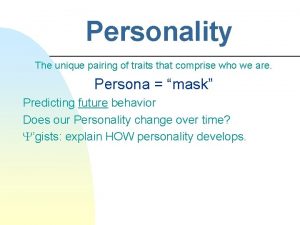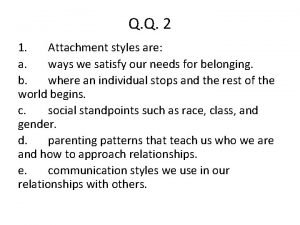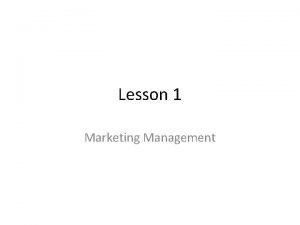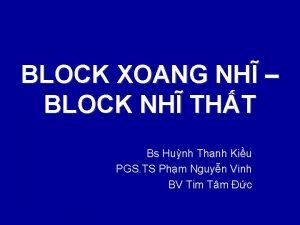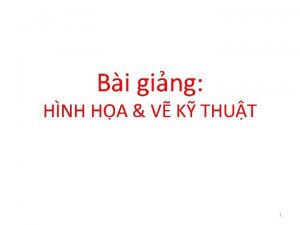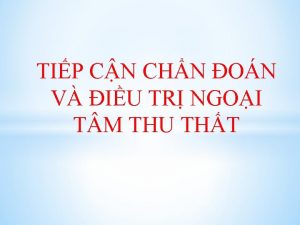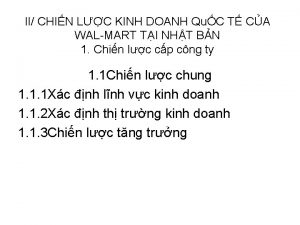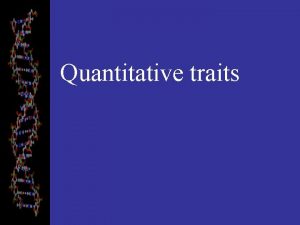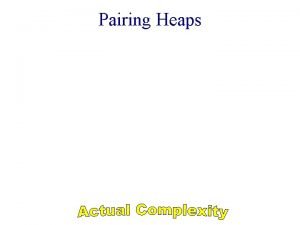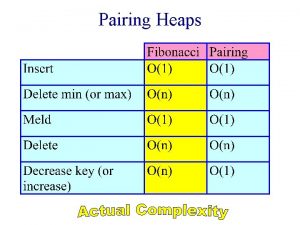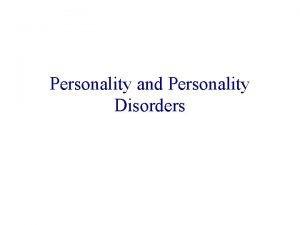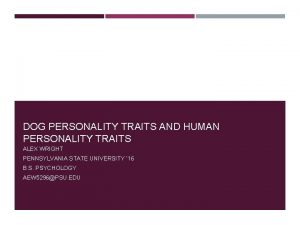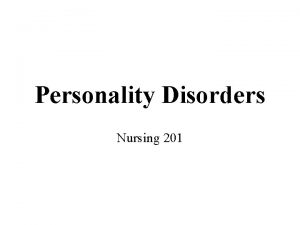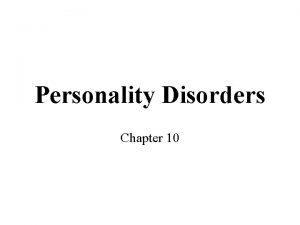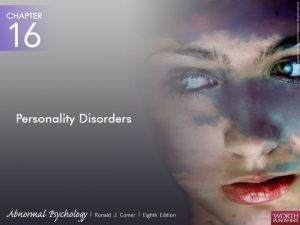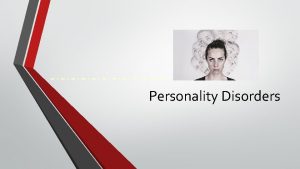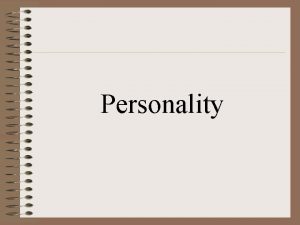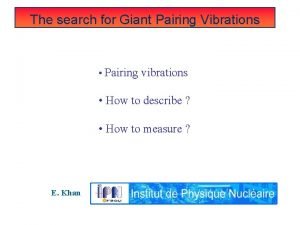Personality The unique pairing of traits that comprise





![Structures of the Personality n ID (“it”) [Pleasure Principle] u Instant n EGO gratification, Structures of the Personality n ID (“it”) [Pleasure Principle] u Instant n EGO gratification,](https://slidetodoc.com/presentation_image_h2/014ac7c459d7a9fe46d5b5076499d2d7/image-6.jpg)









- Slides: 15

Personality The unique pairing of traits that comprise who we are. Persona = “mask” Predicting future behavior Does our Personality change over time? ’gists: explain HOW personality develops.

Personalit y Learning Objectives: n n n Psychodynamic Theory Trait Perspective Learning Perspective Humanistic-Existential Perspective Sociocultural Perspective Measurement of Personality

Psychodynamic Theory: Freud n Personality is determined by conflict u 1 st external, then internal (opposing inner forces) u. At any given moment our behavior, thoughts, and emotions represent the outcome of these inner contests n Emphasis on Unconscious motives

Psychosexual Development Freud: human mind is like an iceberg n Conscious n Preconscious n Unconscious superego Id

Structure of the Personality Freud: n n n used Psychoanalysis to explore the personality Developed the Structures of the Personality to describe the clashing forces of “P” Mental structures that explain different aspects of behavior
![Structures of the Personality n ID it Pleasure Principle u Instant n EGO gratification Structures of the Personality n ID (“it”) [Pleasure Principle] u Instant n EGO gratification,](https://slidetodoc.com/presentation_image_h2/014ac7c459d7a9fe46d5b5076499d2d7/image-6.jpg)
Structures of the Personality n ID (“it”) [Pleasure Principle] u Instant n EGO gratification, present @ birth [Reality Principle] u Reason n and good sense SUPEREGO [Moral Principle] u Moral guardian

Psychosexual Stages n n n Sexual impulses are a central factor in development of “P” (even among children) “Eros”-major instinct aimed at preserving, perpetuating life Insufficient or excessive gratification at any stage could lead to fixation and trait development

The 5 Psychosexual Stages n n n ORAL (1 st yr) conflict: weaning=frustration ANAL (2 nd yr) Retentive/expulsive PHALLIC (3 -6) Oedipus/Electra, “Penis Envy” LATENCY (7 -12) Repression of sexual impulses GENITAL (Puberty +) express libido: intercourse

Other Psychodynamic Theorists n Carl Jung (influence of culture) u. Collective n n n Unconscious / Archetypes Alfred Adler: Inferiority Complex Karen Horney: Parent-child relationships Erikson: social relationships u we’re “conscious architects” of our own “P”

Trait Perspective Historical Overview n n n Hippocrates: 4 fluids Wm. Sheldon: influence of body types Gordon Allport: catalogued traits Hans Eysenck: Focus on sets of traits Five Factor Model (very popular)

Five Factor Model: (O. C. E. A. N. ) n n n Largely inborn, related to basic temperament Openness To Experience Conscientiousness Extroversion Agreeableness Neuroticism / Emotional Stability

Learning Perspective n Behaviorism: “P” is plastic u John Watson u Environmental influences, Not thinking n Social-Cognitive Theory u Albert Bandura u Observational learning, values, & experiences are the major factor

Humanistic-Existential Perspective n Importance of personal and conscious experiences Freedom, personal responsibility are the essence of life Abraham Maslow n Carl Rogers “Self Theory” Sense of “self” n n is innate / inborn. It is our guiding principle

Sociocultural Perspective n n Role of ethnicity, culture, gender, SES in “P” formation Importance of Acculturation u. Individualism u. Collectivism

Measurement of Personality n Take a sample of behavior to predict the future. Use in jobs, school n Objective: concrete/definite answers n u ex. n MMPI & CPI Projective: ambiguous stimuli u ex. Rorschach & TAT
 Unique pairing personality
Unique pairing personality The views of ____ comprise the generalized other
The views of ____ comprise the generalized other Focus synoynm
Focus synoynm What comprise a community
What comprise a community Marketing management
Marketing management Block nhĩ thất độ 1
Block nhĩ thất độ 1 Tìm vết của đường thẳng
Tìm vết của đường thẳng Sau thất bại ở hồ điển triệt
Sau thất bại ở hồ điển triệt Thể thơ truyền thống
Thể thơ truyền thống Hãy nói thật ít để làm được nhiều
Hãy nói thật ít để làm được nhiều Thơ thất ngôn tứ tuyệt đường luật
Thơ thất ngôn tứ tuyệt đường luật Tôn thất thuyết là ai
Tôn thất thuyết là ai Ngoại tâm thu thất chùm đôi
Ngoại tâm thu thất chùm đôi Walmart thất bại ở nhật
Walmart thất bại ở nhật Gây tê cơ vuông thắt lưng
Gây tê cơ vuông thắt lưng Qualitative traits vs quantitative traits
Qualitative traits vs quantitative traits
